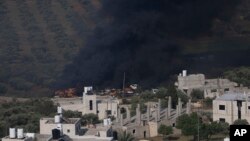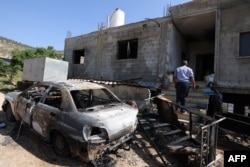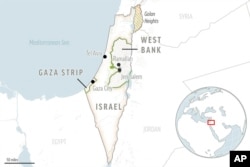"The heinous murder of the boy ... is a serious crime,” Israeli Prime Minister Benjamin Netanyahu said in a statement.
The body of 14-year-old Binyamin Achimair was spotted by a drone. He was found near the Malachei Shalom outpost, which is near the city of Ramallah and where he disappeared while herding sheep.
According to Israeli media, Achimair was last seen leaving the settler outpost early Friday to tend to the livestock nearby. The sheep returned to the outpost hours later without him, reports said.
Israeli media said Achimair was not shot but did not specify how he was killed.
No one has claimed responsibility for the killing.
The discovery of Achimair’s body sparked intensified violence by Israeli settlers on Palestinian villages.
Dozens of settlers set fire to 12 homes and several cars in a village near the site where Achimair’s body was found. The Palestinian Health Ministry said three people from the village were injured, one critically. Border police fired tear gas at villagers who gathered, trying to disperse them.
Previous manhunt and attacks
Violence erupted Friday afternoon when Jewish settlers who were part of the original manhunt for Achimair, raided the village of Al-Mughayyir, some 500 meters west of Malachei Shalom, according to an AFP reporter.
At least one person was killed and 25 wounded, the Palestinian Health Ministry said.
During that manhunt, the settlers fired shots and torched numerous homes and cars in the village, while residents responded by throwing stones, according to AFP reporters who were on site.
Mayor Amin Abu Alyah said, "settlers raided the town with the excuse of searching for the missing Israeli boy," adding that "the army arrived to back them up."
Arafat Abu Alia, a resident of Al-Mughayyir, said the Israeli army told residents to gather on the outskirts of their village. "More than 10 houses and 50 vehicles were burnt," he told AFP.
War with Hamas affects West Bank, too
Tensions are high across the Israeli-occupied territory since Israel’s war against Hamas began on October 7. That’s when the U.S.-designated terror group Hamas attacked south Israel, killed approximately 1,200 people and abducted over 240 hostages.
Hamas is believed to still be holding roughly 100 hostages, as well as the remains of about 30 people who either died in captivity or were killed in the terror attack that triggered the war.
Since then, Israel's retaliatory offensive in Gaza has killed over 33,000 people, according to the Hamas-run territory's Health Ministry. Aiming to eradicate Hamas, Israeli forces have razed large parts of the enclave — reducing it to rubble — and displaced most of Gaza's population. More than 1 million people are now sheltering in the southern border city of Rafah.
In the West Bank, more than 460 Palestinians have been killed, mostly in skirmishes caused by army raids and vigilante Israeli settlers.
Expanding Israeli settlements in the occupied West Bank have turned the area into a powder keg. Israeli outposts are not authorized there, and the international community overwhelmingly considers them illegal. However, consecutive Israeli governments have allowed sprawling Israeli settlement construction in east Jerusalem and the West Bank, which Palestinians stake as their future state.
Over 700,000 Israelis now live in the occupied West Bank and east Jerusalem. The West Bank alone is home to around 490,000 Israeli settlers. The territories were seized by Israel in 1967.
Call for protective deployment
Francesca Albanese, the United Nations special rapporteur on the rights situation in the Palestinian territories, urged the U.N. to "authorize the deployment of a protective presence in the occupied Palestinian territory, with the explicit mandate to prevent and [repel] attacks against civilians."
"The Israeli army has abundantly proven unwilling or unable to ensure that task," she wrote on X.
Some information for this report was provided by The Associated Press, Agence France-Presse and Reuters.











